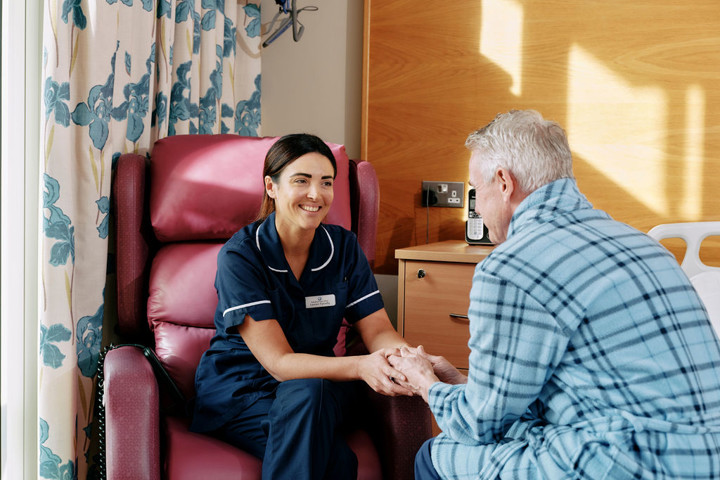
Care at Hospice
At times, you may need round the clock care that can be provided on the In Patient Unit.
Wednesday 05 Mar 2025
Rose Naylor joined Jersey Hospice Care last summer as the director of palliative care services and brings to her role a 40 year career in nursing and healthcare. Responsible for ensuring that the clinical teams can deliver “the best possible palliative and end-of-life services to anyone in Jersey who needs them”, Rose now oversees the charity’s community and Hospital palliative care teams, as well as the inpatient service based at Clarkson House and Jersey Hospice Care’s Counselling and bereavement service.
“It’s a broad role, which reflects our intention to reach as many Islanders as possible,” said Rose, “something which is underpinned by the new palliative and end-of-life care strategy developed by Jersey Hospice Care in conjunction with the government.”
At its heart, adds Rose, the strategy brings together a range of partners from across the health and care system in Jersey to work together to enhance the standard of care, make it accessible to more Islanders and provide greater education around palliative and end-of-life care.
“Ultimately, it is about giving people a choice about what they want to do when they receive that difficult news,” she explained. “Our teams support people to think about what they want to do with their remaining time, where and how they want to receive their care and, finally, where they would like to die. We support them and their families through that time in a practical and positive way, enabling them to maximise the time they’ve got left and helping them to fulfil any final wishes.”
Describing the importance of that support, Rose added: “Being told that you only have months or weeks to live is a huge moment in someone’s life and being able to support people as they break that news to their families, and then providing support not just with symptom management to support their comfort but also with their emotional and spiritual care needs, is tremendously valuable.”
Indeed, the feedback which the palliative care teams receive from families shows, Rose adds, just how important their services are.
“When people are diagnosed with a life-limiting condition, it can feel as though everything has been taken out of their control,” she reflected. “Our goal is to give them that control over what they want to do as they approach the end of their life, something which helps both the individual and their relatives because our support leaves a positive and lasting legacy with the family.
“While grief is difficult and painful, and part of the process of losing a loved one, the feedback we receive is that the better prepared families are, through the work of our teams, the less painful it is when their loved one has gone.
“Our services give families the knowledge that their loved one’s last wishes were respected and that they received the care they needed in the way they wanted it. That lasting memory is so important.
“We also hear from families that our services have enabled them to be families again. By taking the nursing responsibilities away from partners, parents, children etc, people can return to being the individual’s wife, husband, son or daughter, something which is incredibly special and important.”
Of course, delivering such services comes at a cost, and Rose is quick to acknowledge that “we couldn’t do what we do without the generosity of Islanders”.
“We know from the feedback we receive from people who have used our services – many of whom then join the charity as a volunteer or fundraise on our behalf – that the work we do is important and has a big impact on people’s lives,” she said.
“It costs £8m a year to run our services, and we have to generate 57% of that money through our retail division and fundraising. Without people’s generous donations, we simply couldn’t deliver the range of services that we do.”
With fundraising so critical to the organisation, this weekend the charity is inviting people to come Together For Hospice, in a new 72-hour crowdfunding initiative, which gets under way at noon on Friday.
The brainchild of Cheri Strudwick, the charity’s director of income generation and marketing, the event will see a number of Hospice Heroes undertake fundraising activities ranging from cake sales to triathlons.
Meanwhile, Islanders are encouraged to support a hero or make a donation to the charity over the weekend, with all money raised over the 72 hours – up to the value of £50,000 – being matched by private individuals, giving the charity the potential to generate up to £100,000.
For more information on what’s happening over the weekend, visit https://www.jerseyhospicecare.com/events/together-for-hospice/